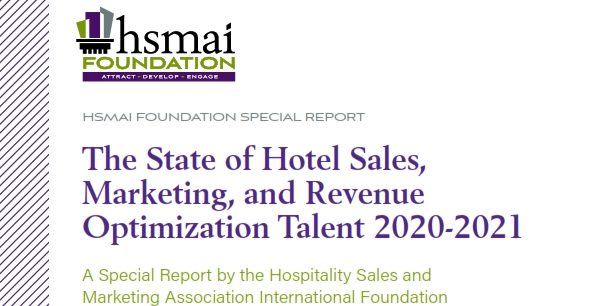By Karen Wollard, Ed. D., CHDM, HSMAI Foundation Research Manager
The strong economy of 2019 brought with it record-setting group business. As the pandemic took hold, companies of all sizes cut meetings and travel. Bookings fell off and new bookings stopped. How can you keep sales, marketing, and revenue staffers when their quotas and expectations cannot be met through no fault of their own? The HSMAI Foundation’s State of Hotel Sales, Marketing, and Revenue Optimization Talent: 2020-2021 special report dives into this topic.
 Knowing the key metrics that matter to various stakeholders and adjusting them based on the shifting realities of the pandemic became an important way to keep employees focused on driving profitable business. The pandemic taught everyone that reliance on systems and historical data is no longer enough. There are so many other components that can change the outcomes in a volatile environment.
Knowing the key metrics that matter to various stakeholders and adjusting them based on the shifting realities of the pandemic became an important way to keep employees focused on driving profitable business. The pandemic taught everyone that reliance on systems and historical data is no longer enough. There are so many other components that can change the outcomes in a volatile environment.
One hotel company’s approach was to create an analytics workgroup that was tasked with identifying and defining 30 metrics. In doing so, it became clear, for example, that the value of the salesforce is in talking with the customer and that the paperwork, coverage expectations, and follow up on planning they were doing undermined their key contribution. In the past, the expectation was that sales would just go up. Now, there is a need to make and justify changes in strategy to drive sales. Revenue managers and marketers must provide the data to right-size expectations for their sales goals. One CEO added that while the measurements haven’t changed, the benchmarks have. For some resort properties, 2020 and 2021 were their best years ever, while city properties have yet to recover. Leisure travel is fueling demand and growth worldwide, as attendees at the Americas Lodging Investment Summit heard in January 2022.
Commercial teams need to have realistic goals and feel like they can win, even when the old indicators aren’t useful. Setting goals once a year may no longer be effective. HSMAI has begun to look at the impact of COVID-19 on the attraction, motivation, and evaluation of front-line sellers. Hospitality saw a lot of sellers leave for other industries such as medical devices, pharmaceuticals, technology, and others whose compensation, benefits and work schedules were preferable.
Sellers are motivated by incentives; they are competitive by nature. This drive was thwarted as travel halted. In 2019, many hotels and brands worked from annual plans, adjusting in 2020 and 2021 by suspending incentive plans or shortening the plan period. Setting quotas became a moving target as forecasts were recast. Many organizations moved away from individual incentives to team incentives in 2020 and 2021 to adjust to volatile markets and smaller headcounts. Organizations that want to retain their top sellers will have to continue to tweak and monitor compensation to ensure that sellers are working to reconnect with previous clients while reaching out to new targets and markets. There is increasing attention on “hunters” versus “farmers” as salespeople are hired back, a direction that HSMAI and the Foundation will continue to watch.
Increased coordination across sales, marketing, revenue optimization, and IT have been hallmarks of the pandemic response. Shifting specialized individuals toward broader segments to target priority potential markets required coordination and integration. Account management became more of a team effort. Commercial executives had to demonstrate support for their teams and build a culture of collaboration that may have otherwise taken years to evolve.
Sales teams are expected to do more than ever, including performing the tasks of their previous support teams. Hiring will be challenging. The layoffs of early 2020 were aimed at reducing the low performers or consolidating positions; now new hires will be expected to not only be top talent, but they must be able to take on additional accounts and work across a broader spectrum of markets. Where these exceptionally skilled individuals will come from and how organizations will attract and retain them will be a focus of HSMAI’s advisory boards and the HSMAI Foundation’s research activities. In the past, tenure has correlated with improved performance to goals, suggesting that planning to bring aboard new sellers may require a different mindset and development strategy.
The overall impression is that hospitality salespeople are not as well compensated as those in other industries. This may mean that base compensation needs to be increased and that incentives should be competitive to compete with other industries. Finding the balance to attract top new talent while retaining existing top sellers will be challenging.
This is an excerpt from the HSMAI Foundation’s State of Hotel Sales, Marketing, and Revenue Optimization Talent: 2020-2021 special report. To learn more about the HSMAI Foundation and its mission, visit the Foundation website.
